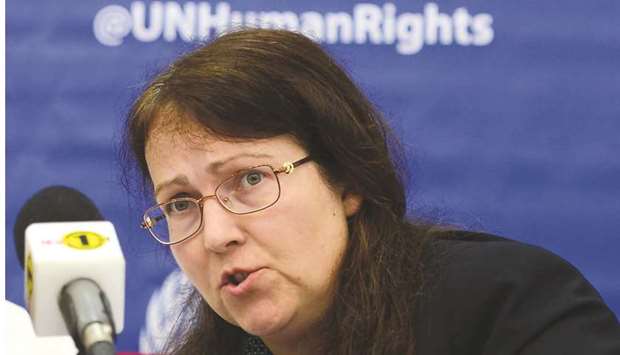The United Nations yesterday urged the Sri Lankan government to urgently
implement reforms to end war-time arbitrary detention and strengthen
independent
monitoring of tough legislation.
Sri Lanka has used the 1979 Prevention of Terrorism Act (PTA) to pursue a
tough line to prevent aiding and abetting terrorism in the island
nation’s long conflict with Tamil Tiger rebels.
That legislation gives wide powers to police to arrest a suspect without
informing the immediate family, restricts access to lawyers and allows
detention of up to 18-months without charging.
The war ended in 2009, but the government has not repealed PTA, though it had promised to end arbitrary detentions.
Many ethnic minority Tamils who have been arrested under the PTA have complained of years of detention without
being charged.
The UN is now asking Sri Lanka to repeal the draconian law and introduce an internationally acceptable law.
The government says it has begun moves to replace the PTA and is in the process of
introducing new legislation.
“There are no effective safeguards against arbitrariness in this context
and there is an urgent need to strengthen mechanisms for independent
monitoring and oversight,” Leigh Toomey, a member of the UN working
group on arbitrary detention told reporters in Colombo after concluding a
11-day mission.
She said they had identified significant challenges to the right of
personal liberty in Sri Lanka, resulting in arbitrary detention across
the country.
The Working Group also said their attention had been drawn to a loss of
liberty among the socially vulnerable, such as children, women, elderly
people, people with psycho-social problems and the poor.
Sri Lanka is under criticism from the rights groups over its slow
progress on the commitments it made to the UN human Rights council
following a UN resolution that called for post-war reconciliation and an
investigation of all alleged war crimes.
Sri Lanka ended a 26-year-civil war crushing the separatist Liberation
Tigers of Tamil Eelan in 2009. The United Nations and rights groups have
accused the military of killing thousands of civilians, mostly Tamils,
during the final weeks of the
conflict.
The Tamil Tigers were also accused of widespread abuses during the war,
such as using child soldiers and targeting civilians with suicide
bombers.
In November European lawmakers said they were disappointed about Sri
Lanka’s slow roll-out of human rights reforms that it had promised in
exchange for trade concessions.
A UN rights watchdog in 2016 called on Sri Lanka to investigate
documented allegations of torture and rape of detainees by security
forces and to rein in broad police powers.
The UN Committee against Torture described continuing reports of
abductions, deaths in custody, poor conditions of detention and the use
of forced confessions in court.

Leigh Toomey, member of the UN working group on arbitrary detention, addresses a press conference in Colombo yesterday.
